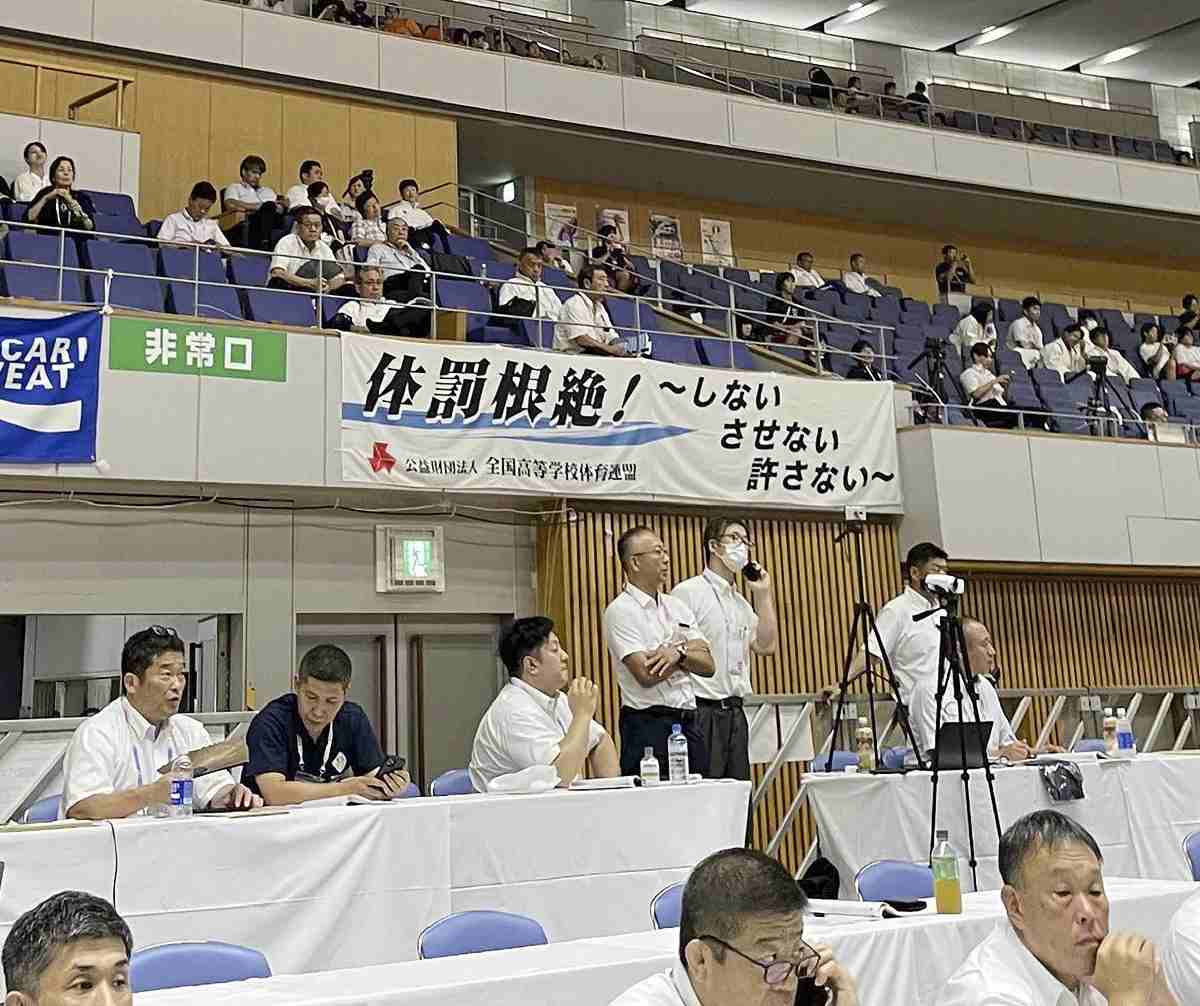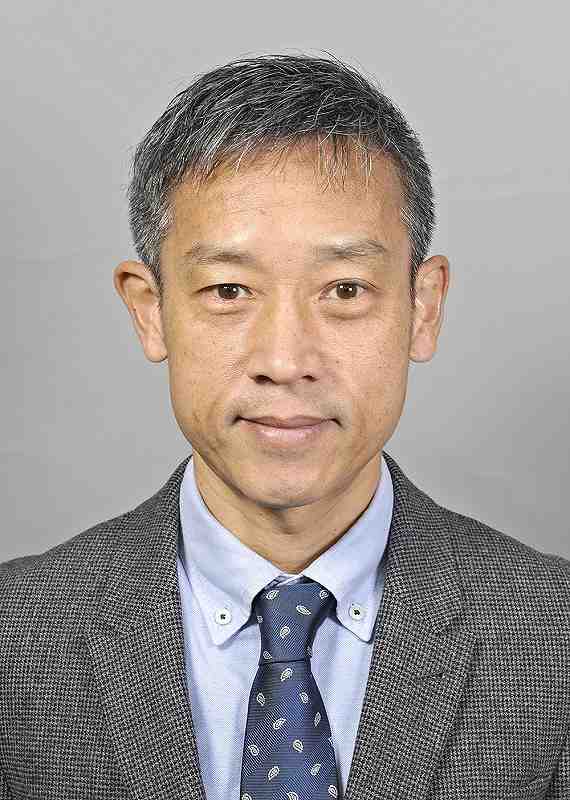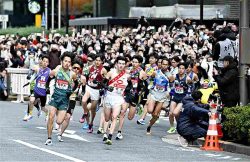
A banner promoting the eradication of corporal punishment is displayed at the venue of this year’s Inter High School Athletic Meeting.
8:00 JST, September 2, 2023
Violence in sports coaching is a stubborn, deep-rooted problem. A decade has passed since the “Declaration on the Eradication of Violence” was adopted by the sports community in 2013, and various efforts are spreading across the country, but reports of abuse in fiscal 2022 were the highest ever. Trial-and-error efforts to eliminate violence continue.
Violence in the sports world was highlighted as a major social issue in 2012. This was the result of the suicide of the captain of the basketball team at the then Osaka municipal (now prefectural) Sakuranomiya High School due to violence inflicted by his advisor. In the incident, the captain committed suicide a day after being attacked by his coach. The coach was dismissed from his position on disciplinary grounds and was found guilty of assault and battery. The city of Osaka was ordered to pay approximately ¥75 million in damages to the bereaved family in a civil lawsuit.
In 2013, a judo coach was found to have physically abused a female athlete. This prompted the Japan Sports Association (JSPO), the Japan Olympic Committee (JOC), the Japan Para-Sports Association, the All Japan High School Athletic Federation, and the Nippon Junior High School Physical Culture Association to announce their “Declaration on the Eradication of Violent Acts” on April 25, 2013. The declaration strictly condemns violence in sports as “a truly shameful act that denies human dignity, uproots the relationship of mutual trust between coaches and sportspeople, and negates the very existence of sports itself.” The declaration clearly states that “the mistaken notion that violence is a necessary evil in coaching should be abandoned.”
In the same year, the Education, Culture, Sports, Science and Technology Ministry also formulated guidelines for the guidance of school sports club activities. It stated that “it is wrong to think that violence is acceptable if there is a relationship of trust with the students,” and urged schools not to force students to practice excessively in the pursuit of victory.
Ten years have passed since then. The social momentum to reject violence has grown, and various grassroots efforts have spread.
In November 2021, a regional sports club based at Sakuranomiya High School was established with the aim of creating a school that is open to the community. It was based on the idea that when the 2012 tragedy happened, what went on inside the school was invisible to outside eyes. The club interacts with neighboring municipal junior high schools on weekends and has become a model for club activity reform.
Naomi Masuko, a former member of the women’s national volleyball team who became head of the JSPO’s Japan Junior Sports Club Association in June, has organized the “Coach Must Not Get Angry” competition since 2015, in which coaches are prohibited from getting angry. She has worked to spread “no-anger coaching” throughout Japan, including in Akita, Kanagawa, Nagano, Hyogo, Hiroshima and Fukuoka prefectures.
In March of this year, the Tsubomi League, a youth baseball tournament with special rules prohibiting abusive language and angry voices, got started in Adachi Ward, Tokyo. The league operates under a system that requires coaches and parents on the bench and in the cheering section to strictly follow a “no yelling” rule, and teams that fail to comply are barred from participating in the league. The league consists of about 30 teams in and outside of Tokyo that agree with its philosophy.
Thanks in part to the progress of such steady activities in various regions, momentum toward rejecting violence and abusive language has steadily increased in the field of sports. However, although the number of public school teachers disciplined for corporal punishment peaked at 3,953 in fiscal 2013 and has been decreasing, there were still 393 of them in fiscal 2020.
In addition, the JSPO received 373 complaints of harm in fiscal 2022, the largest number ever. Of those complaints, 34% were for verbal abuse; 26% were for power harassment, including neglect; 13% were for physical violence; and 3% were for sexual harassment. The percentage of verbal abuse was the highest ever.
This can be said to reflect the fact that the environment is becoming more conducive to speaking out, but JSPO Executive Director Yusaku Morioka says that the number of complaints is “just the tip of the iceberg. In recent years, the percentage of complaints cases involving verbal abuse and neglect has increased in place of corporal punishment and other forms of violence, but there is a tendency for such cases to become more insidious and less visible.”
Attorney Shoichi Sugiyama, an expert on sports and human rights, points out that “in many cases, anonymous reporting and testimony by children do not lead to a solution because the damage cannot be proven.” He suggests expanding support after a complaint is made. In the United States, the Center for SafeSport, a public reporting and counseling organization, has been established. The center has the authority to interview both alleged perpetrators and victims and impose disciplinary measures.
Masuko, who has been promoting the “Coach Must Not Get Angry” competition, also strongly emphasizes the importance of raising the awareness of parents. She receives many messages through letters and social media. Recently, she received a handwritten letter from the mother of an elementary school student who was troubled by the abusive language of the coach of a volleyball team in Tokyo.
In the letter, the mother expressed concern for her child’s safety, and said that when she questioned or criticized the coaching, she was “ignored by other parents.” Masuko commented: “In many cases, parents who are supposed to protect their children end up condoning problematic instruction. There is still a mindset that says, ‘Please be stricter with my child.’”
This spring, a coach at Omuta High School in Fukuoka Prefecture, which is known for its strong long-distance track and field team, submitted a resignation letter to the school for physically punishing his team members. The school accepted the resignation, but the parents of the team members demanded that the coach continue to teach the team members on the condition that he would not inflict corporal punishment on them again.
In an interview with The Yomiuri Shimbun last December, the father of the basketball team captain who committed suicide due to physical abuse at Sakuranomiya High School commented on the fact that corporal punishment continues unabated in school club activities. “There still remains a naive view that glorifies enduring violence and condones violence by coaches,” he said. “To prevent the emergence of another victim like my son, I hope that the coaches will respect the individuality of children and let them think and develop their abilities.”
In April this year, the JSPO announced the launch of the “NO! SPOHARA” campaign, which aims to eliminate violence, verbal abuse, harassment and other inappropriate behavior in sports. The JSPO defines “spohara” — a contraction of “sports harassment” — as “any behavior that harms the safe and secure enjoyment of sports,” and will hold training sessions for parents. Morioka said: “In addition to the awareness-raising activities that we have been focusing on for coaches, we will also appeal to parents as the main target. Society as a whole, including parents, must eradicate violent coaching.”
Political Pulse appears every Saturday.

Yuji Kondo
Yuji Kondo is a senior writer in the Sports Department of The Yomiuri Shimbun.
Top Articles in Editorial & Columns
-

Riku-Ryu Pair Wins Gold Medal: Their Strong Bond Leads to Major Comeback Victory
-

China Provoked Takaichi into Risky Move of Dissolving House of Representatives, But It’s a Gamble She Just Might Win
-

University of Tokyo Professor Arrested: Serious Lack of Ethical Sense, Failure of Institutional Governance
-

Policy Measures on Foreign Nationals: How Should Stricter Regulations and Coexistence Be Balanced?
-

Japan’s Plan for Investment in U.S.: Aim for Mutual Development by Ensuring Profitability
JN ACCESS RANKING
-

Japan PM Takaichi’s Cabinet Resigns en Masse
-

Japan Institute to Use Domestic Commercial Optical Lattice Clock to Set Japan Standard Time
-

Israeli Ambassador to Japan Speaks about Japan’s Role in the Reconstruction of Gaza
-

Man Infected with Measles Reportedly Dined at Restaurant in Tokyo Station
-

Videos Plagiarized, Reposted with False Subtitles Claiming ‘Ryukyu Belongs to China’; Anti-China False Information Also Posted in Japan























